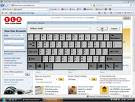Again, by hiring other people to do the actual collection work for you, you'll not only free yourself for other work, but you'll be making more money: Three people can do more in less time than one person.
The next thing is to set up an area-wide collection depot. This could be a pre-fab building on a vacant lot, a vacant used car lot, or a closed service station.
In setting up an area-wide (or neighborhood) collection depot, you will need space - some sort of shed to store or stack your papers in until you load them up and haul them to the recycling center where you sell them. You'll need a scale to weigh them, and some sort of office or desk space to manage your cash and books.
You'll need space enough for your customers to drive in beside the scale and unload their papers, and at the same time an arrangement whereby you can pay them immediately. A vacant service station would be ideal. Your customers can pull in just as if
they were going to purchase gasoline; you could have your scales set up between the driveways where the gas pumps are usually located, and store your accumulating loads in the service area of the building.
In most cities or counties, you'll need a business license or permit. For more details, see our report, Basic Steps To Starting Your Own Business.
You'll need a couple of signs, one on each side of your driveway. These will announce the fact that you buy old newspapers. They need not be anything fancy, just simple attention-getting announcements that you're open for business and paying money for paper. Generally, the going rate for newspapers dropped off at a central collection depot is $.02 per pound, and the papers need not be bundled. This will give the sellers $40 a ton for dropping them off, and at $50 a ton, that will work out to $10 per ton profit for you. (Again, these rates are rising, so be sure you are absolutely current by checking out the going price in your area.)
In addition to old newspapers, you should organize your time and schedule to call upon all the businesses, stores and warehouses in your area. Talk to the business owners or store managers and ask them if you can haul away their old cardboard boxes.
If there's competition in your area, you might end up having to pay for these boxes, provided they're clean. The thing to do is to call upon everybody who uses paper products or cardboard boxes. Remember, the more people you have giving you paper, the
more money you are going to make. Many already established recycling services do not bother with the smaller stores and warehouses, but these add up quickly if you are diligent in finding a number of them.
Check close by in your surrounding area, and find out if the businesses are satisfied with their present pick-up service. Ask first if you can "have" their old boxes; many of the smaller stores will give them to you because it decreases the load for their rubbish service to haul away. Where necessary, offer to pay per pound if they'll save them for you.
As mentioned before, the important thing is to get everyone providing paper for you - people collect and have it ready for you to pick up when you drop by on your designated collection day. Besides that, you start making really big money when you can park your truck in one place and fill it up from a group of closely located stores or businesses. With this is mind, you could conceivably drive through four blocks, making one stop in the middle of each block, and have a ton or more of paper or cardboard
boxes every fourth block.
One other thing you'll need in order to efficiently handle cardboard boxes is a sharp knife with which to slit the sides of the boxes and flatten them Out as you load them onto your truck or trailer. A simple "handyman's utility knife" costing about $5 will handle this chore for you with ease. When you buy one, though, be sure to buy an extra supply of blades as well, because cutting through cardboard will dull your knife very quickly.
Another paper products source: the offices in your area, particularly those with computers. The age of computers has ushered in more reports for offices than ever before, adding reams and reams of paper to the average office trash basket. When you
visit these offices, take along a couple of "Save-a-Tree" boxes and ask the office people to discard all their waste paper into these boxes for you - letters, envelopes, outdated reports and files. You can usually get the "Save-a-Tree" boxes at your recycling depot, and when full, we're talking about 35 to 45 pounds of paper. Most offices will fill one of these boxes in a week or two, depending, of course, upon their volume of paperwork. And while you're on this kind of "foraging" trip, don't forget to check in at all the print shops. They waste and throw away almost as much paper as they sell.
It will pay you to contract for a quarter page ad, or the largest ad available that you can afford, in the yellow pages of your area telephone and business directories. Whether or not you advertise the prices you pay in the ad is entirely up to you, but
generally it's not a good idea to do so, because you would be stuck with those rates for over a year. You might word your ad to explain that you pay one rate per pound when paper is brought to you, and another rate when you pick up and haul away.
At the same time, you should run a regular classified ad, perhaps even one with more words in the Contract Jobs section of your daily paper. Your best advertising days will be Thursday through Saturday. These are the days when people are specifically
thinking about cleaning up around the house or their offices. Also, these are the days when people think about what they can do to earn extra money.
This is the kind of business that "snowballs" with visibility and word-of-mouth advertising. It will definitely benefit you, then, to join the various civic and service clubs in your area, attend their luncheons and mingle with the business leaders in your area. Volunteer to assist in some fund-raising events, and whenever possible, become a guest speaker and tell about your business.
It isn't hard to stand up before a group of people and talk about your business, particularly if you know what you're talking about and believe in what you're saying. It does take at least an outline of a script, perhaps a few notes, a rehearsal and the essential ingredient of enthusiasm.
Make your talk interesting and informative. Do some research and present statistics on how much paper the people of this country use each year. Explain the limited supply of timber, and the need to recycle as much as possible. Detail how these facts
and figures opened your eyes, and caused you to do something about it - to open your own recycling center. And then, lead your talk into explaining how the recycling business is an avenue for everyone to benefit: the ideal fund-raising endeavor; a cleaner environment; and a chance to preserve some forest land.
Getting free publicity for a recycling center can be easy. In addition to serving as guest speaker before civic and service groups in your area, you may find radio and television stations and newspapers, and even weekly shopping guides anxious to give
you time or space.
By all means, try to get a story into these people detailing your grand opening, follow-up with appearances on talk shows, and press releases about the different organizations raising money by collecting newspapers and turning them in to you. Set up a contest among the different organizations, with prizes for the teams or organizations collecting the most paper. Hold special "Seniors' Days" when you pay extra for all paper turned in by persons over a certain age. Keep an eye out for angles such as the largest amounts turned in, and stories about your regular collectors who keep turning in paper regularly until they attain money goals.
Emphasize in your publicity contacts that recycling is a kind of community service that benefits all citizens. You're cleaning the environment, conserving timber, and putting money into the pockets of all who participate. Think about it; submit press releases to the media; calling them and inviting them to cover human interest stories emanating from your business!
This business takes organization, some energy on your part, and at least in the beginning, your time. But if you put forth the effort as we have outlined, there's no reason you shouldn't easily realize a very comfortable income with your own RECYCLING BUSINESS. It takes effort on your part, but if you're looking for a lucrative business, you have here a plan to act on!located stores or businesses.










